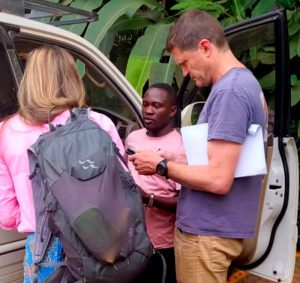13 expert tips for protecting your valuables while traveling
13 expert tips for protecting your valuables while traveling, From laptops, travel documents, jewellery, smartphones, travel cash, passports, cameras, and credit cards, many of us take a lot of valuables on safaris. However, nothing is more frustrating than losing your valuables during a trip, and for this reason, it is important to protect them from being stolen or lost.
Whether you’re staying at a luxury Safari Lodge/Hotel/Tented Camps or a Guesthouse/Hostel, anyone can fall prey to loss or theft. Be better prepared for your forthcoming safari with our ultimate guide. Therefore, before you jet off, read our 13 expert tips for protecting your valuables while traveling;
Make sure that you’ve travel insurance #13 expert tips for protecting your valuables while traveling
The number one tip for protecting your valuables while traveling is having travel insurance, which can at least soften the blow of your valuables being stolen/lost. However, most travel insurance policies don’t cover the loss of valuables that were left unattended. For instance, leaving your wallet/purse/bag in a rental car as you head out for dinner or forgetting your phone on the towel as you dip in the swimming pool.
Keep your valuables in the safe #13 expert tips for protecting your valuables while traveling
Many Accommodation facilities (including Hotels, Safari Lodges, Tented Camps, and Hostels) will have a safe (secured with an electronic code) in the room for you to keep your valuables when heading out for your adventures. Any cash you don’t need, passports, or jewelry you are not wearing should all be kept here. For rooms without in-room safes, request the front desk to hold them for you.
Make photocopies of your vital travel documents.
If something goes astray, it will be less stressful to replace your travel documents (especially passports, Visas, medical cards, or driving licenses) if you have photocopies. Therefore, we recommend scanning or photocopying on your phone to make the vital information easier to report when the time comes.
Take a padlock with you.
It’s undeniable that thieves are opportunists, hence will be far more likely to choose your case if it looks like an easy target. For this reason, something as tiny as a padlock will go a long way in putting them off. Budget accommodations such as Hostels and Guesthouses usually have lockers that can be used to keep personal belongings overnight or when you are out. However, it is advisable to bring a good quality padlock and regardless of how friendly your “new-found” friends are, don’t let your guard down.
Stay safe and secure while on the move.
If you intend on using public transportation, it is advisable to always secure your valuables and not leave them unattended to or on the floor. We understand that there’s a likelihood of falling asleep in public, especially when traveling for an extended period. In such circumstances, it is advisable to wrap your bag around your arm or leg or use it as a pillow so that nobody can grab it without waking you up.
Keep cash and travel documents close to you while traveling. Additionally, we recommend using money belts or cross-body purses when keeping passports, money, and credit cards safely.
Be cautious when carrying backpacks.
Carrying a backpack is an indirect invitation for thieves to pickpocket from behind. For this reason, ensure that all your valuables are secured in a deep pocket, especially when carrying a backpack in crowded areas and instead of wearing it from the back, we recommend from your front for added safety when standing in queues or in crowded areas.
Additionally, be cautious when walking with a shoulder bag in certain locations, as thieves on motorbikes (locally known as Boda boda) and scooters are known for snatching bags while riding past.
Use money belts or hidden pouches.
Hidden pouches and money belts are a discreet way of carrying credit cards, cash, and other small valuables. They are different from traditional wallets because they are worn under clothes hence making it difficult for thieves to access them. We all agree that they aren’t the most fashionable accessories but add an extra layer of security.
Don’t put all your valuables in one place.
 All your valuables (cash, visas, cameras, and travel documents) are in different places. Sharing your valuables between bags is a wonderful way to reduce the impact of lost belongings. In so doing, if one of your bags goes missing, you will at least be sure everyone has a clean set of clothes. If you’re traveling solo, you can keep a backup credit card and extra cash stashed away somewhere in the main luggage, just in case your wallet gets stolen while you are out.
All your valuables (cash, visas, cameras, and travel documents) are in different places. Sharing your valuables between bags is a wonderful way to reduce the impact of lost belongings. In so doing, if one of your bags goes missing, you will at least be sure everyone has a clean set of clothes. If you’re traveling solo, you can keep a backup credit card and extra cash stashed away somewhere in the main luggage, just in case your wallet gets stolen while you are out.
Always backup your gadgets
It is a wonderful idea to always back up your important information- documents and photos on your phone, laptop, tablet, or any other device, and then upload them to the cloud. In so doing, you minimize the risk of losing all your valuable information if the phone gets stolen.
Talking of phones, avoid leaving them on tables at Cafes, or backpack/bag at your feet.
Remain vigilant and aware of your surroundings.
Another effortless way to keep your valuables while traveling is vigilance, being aware of your surroundings. Thronged destinations like markets and festivals are usually hot spots for pickpockets. For this reason, always keep an eye on your valuables, especially in places that are known for heavy foot traffic. Staying alert and avoiding distractions will go a long way in minimising theft.
Avoid displaying expensive items.
Flashing expensive items such as large sums of cash, jewellery, and gadgets only makes you an easy target for theft. You can avoid drawing unrequired attention by keeping these items out of sight as much as possible. For example, secure your camera with a strap and close to your body when not in use.
Secure your devices with passwords/passcodes.
Always ensure that your devices- tablets, laptops, and phones are password-protected. Also, include two-factor authentication for vital accounts so that your data is secured when your device gets stolen/lost. In so doing, you can remotely erase important information to avoid identity theft. Additionally, backup your device for sensitive data before traveling so you don’t lose vital information when the device gets lost.
Keep emergency contacts handy.
Finally, before setting off on your safari, put together key contacts that you will access quickly during emergencies. Some of these vital contacts are for the bank, Embassy, Travel insurance provider, and local emergency services, then store them on your phone or write them on a small card to keep in your wallet. You will act quickly when prepared and reduce the disruption to your safari.
